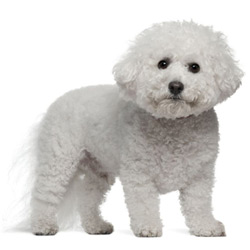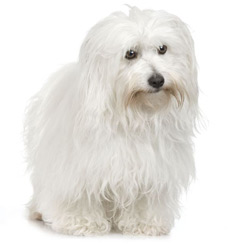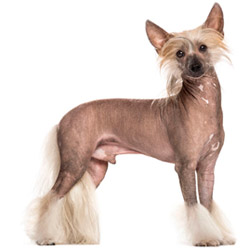The West Highland White Terrier is a devoted, clever, and enjoyable companion

West Highland White Terrier Spotlight
- They are small yet durable
- They have a double-layer coat
- They have small, triangular shaped ears that are highly susceptible to sunburn
- They are highly independent
- They were originally bred to hunt rodents
- They do not like to be handled roughly
- Although fuzzy in appearance, their fur is hard to the touch when their coats are properly maintained
Breed History
Often referred to a “Westies” or “Westys,” West Highland Terriers originated in Scotland and were first given their modern name in the early 1900s. The breed was registered with the AKC under the name Roseneath Terrier 1908 and the name was changed to West Highland White Terrier the following year.
Originally bred for hunting purposes, they were a valuable asset to Scottish farmers and were often trained to hunt and kill rodents and other small nuisance mammals that posed a threat to crops or farm animals. Some maintain this instinct to hunt after small critters, but a large portion of the breed has lost this instinct over time as they have been trained to fit into a more picture-perfect home lifestyle.
Westies are a popular breed of choice in many parts of the world. They were ranked the most popular terrier breed in the early 2000s and they are currently ranked the 42nd overall most popular breed by the AKC. Westies have made numerous television and film appearances and they are used as the mascot of Cesar, a gourmet brand of dog food that caters to the dietary needs of small dogs.
Personality & Temperament
Westies are known for being loyal and easy to train, although it is not unusual for this breed to exhibit stubbornness at times. If proper training methods are implemented early on they will experience few, if any behavior issues, but improper training and an owner’s inability to act with authority can result in a Westie that has tendencies to bite and displays resource aggression with food and toys.
However, even if these issues do arise, they can be easily corrected when the owner learns to be a leader and provide proper training. Westies are usually good with children, but they do not enjoy rough handling and prefer to be treated gently. They are widely considered to be a social breed, and many Westies make excellent guard dogs. Although small in size, they have medium energy levels and they love to play.
The breed’s social nature can contribute to the development of separation anxiety from the owner, especially if they are routinely confined in an isolated space or left alone at home. There is a lot of variation in temperament across the breed. Many Westies are affectionate toward their owners and prove to be great companions, but it is rare for one to be cuddly or overly affectionate.
However, Westies are known for being much stronger willed and more feisty than other breeds. A significant advantage to owning a Westie is their high adaptability level when it comes to things like living in smaller, apartment-style spaces and tolerating extreme weather. Westies are generally energetic and confident around other dogs but they will not display aggression if they have been properly socialized.
Appearance & Grooming
Westies are a small yet sturdy breed. They are known for their straight white fur, which is typically kept at a length of about two inches. They have dark, almond-shaped eyes, small, upward pointing ears and a head that is overall proportional to their body size.
They have deep chests and their side appearance is mostly flat. Their tails are relatively short and narrow closer to the end. When the Westie is standing up straight, the tail is pointed upward but does not extend higher than the top of the skull.
Westies are double-coated dogs, which means their coat contains two separate layers. The short, soft bottom layer provides protection from severe temperatures while the longer, thicker top layer is designed to wick away moisture, dirt and other debris that could get caught in their fur. Their coats are stiff and dry when maintained properly, and they require regular brushing to get rid of any dead hair.
Westies have strong nails that grow rather quickly and should be trimmed often. Because their coats are naturally dry, bathing them too often can cause problems and should be avoided. Their coats need to be reshaped every so often and it is recommended that they are taken to a professional groomer every four to six weeks.
Health
Even the healthiest of dog breeds are bound to experience some health problems. Although an overall healthy breed when properly cared for, Westies are prone to both major and minor health issues., depending on the dog and its lineage. Common health issues for Westies include:
- Keratoconjunctivitis sicca or dry eye syndrome is relatively common in Westies and some other small breeds. Symptoms of dry eye syndrome include frequent blinking, fluid discharge, swelling of tissue around the eye and more, with severe cases of dry eye syndrome resulting in impaired vision or loss of vision altogether.
- Hypoadrenocorticism or Addison’s disease occurs when adrenal glands are not producing enough adrenal hormones. It can severely affect a dog’s health and it requires specialized veterinary care. Common symptoms of Addison’s disease include excessive vomiting, lethargy and a lack of appetite.
- Craniomandibular osteopathy (CMO), sometimes referred to as “Westie jaw” is a condition that occurs young dogs. It involves the growth of new bone on the dog’s lower jaw and can be very painful. Westie jaw can occur at different stages of a dog’s first year and can be treated with specific medications, although severe cases may also require therapy. Signs that a puppy has this disease include discomfort while chewing food and being sensitive about having its jaw touched.
- Skin issues are especially common in Westies and can be signs of many different things, including allergies, Malassezia dermatitis (a yeast infection), atopic dermatitis or dry skin. If you notice that your Westie is experiencing any form of skin irritation you should see a vet for diagnosis and treatment.
Exercise & Care
Westies require a medium amount of exercise. Daily outdoor walks and frequent indoor playtime will keep them happy and healthy. Westies are fast runners and they love to chase things, which makes sense considering they were bred for exactly that purpose.
Be sure to keep your Westie on a leash or in an enclosed area to prevent it from getting loose. Each dog’s nutritional needs will vary, so owners should work closely with their breeder and their veterinarian to determine a diet plan that works best for their Westie.

 Scotland
Scotland










What do you think?